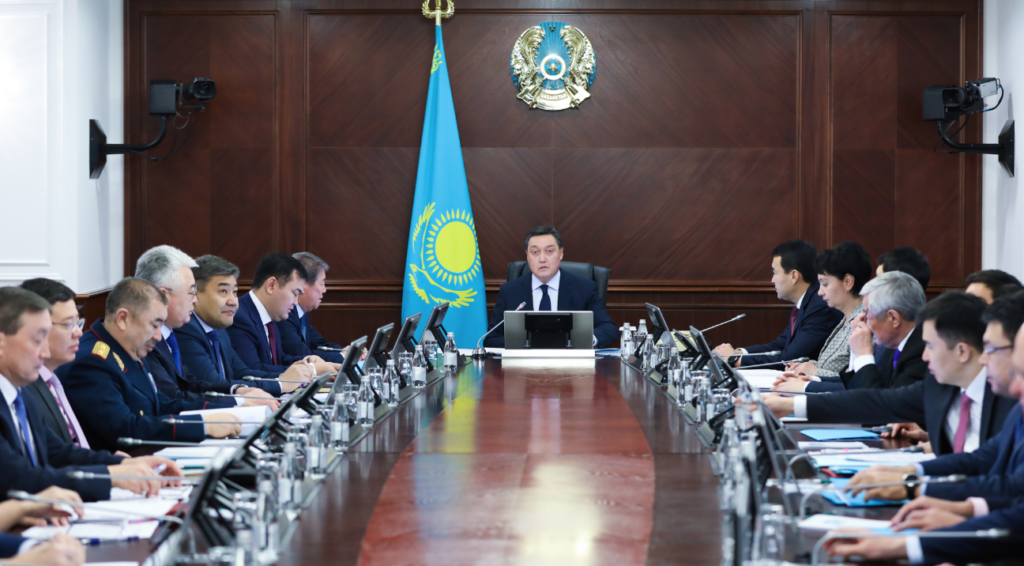ASTANA –The first phase of the 2015-2019 Nurly Zhol programme, designed to upgrade infrastructure build-up throughout the country, will be completed this year. The plan for the second phase will be presented in March.
The programme received 791 billion tenge (US$2.1 billion) in 2018, including 437.2 billion (US$1.16 billion) from the national budget. The funding was allocated to renovate roads (337.5 billion tenge (US$895.7 million)), water transport (0.4 billion tenge (US$1 million)) and railroads (91 billion tenge (US$241.5 million)).
Nurly Zhol ensured the employment of 86,000 people in 2018, exceeding the initial target of 55,000, said Minister of National Economy Ruslan Dalenov. Approximately 4,600 kilometres of roads were improved and 528 kilometres of new roads constructed.
“Nine hundred and twenty-eight kilometres of railways saw a major overhaul. The agreements were signed to purchase 129 units of passenger trains and 43 of those have been delivered. The runway in Kostanai is being reconstructed and the upgrade of the runway in Semei city was completed,” he noted referring to the local airports.
Nearly 2,400 kilometres of national roads were reconstructed and 4,400 kilometres will be rebuilt this year, employing more than 100,000 road construction workers, said Minister of Industry and Infrastructure Development Roman Sklyar.
“The construction works will start from Karaganda to Almaty and from Aktobe to the border with Russia. We expect to open traffic on 654 kilometres of reconstructed roads. The works will be finished at Astana-Pavlodar (441 kilometres), Schutschinsk-Zerenda (80 kilometres), Beineu-Akzhigit (85 kilometres), Taskestken-Bahty (20 kilometres) and Zhetybai-Zhanaozen (73 kilometres) segments,” he noted.
He reiterated the asphalt paving shortage problem during the construction peak.
“To address this issue, we ask considering the introduction of a ban on exporting bitumen products,” the minister added in addressing the government.
Kazakh roads are continuing to test the toll system nationwide. In January, the government introduced the system on 471 kilometres of the Almaty-Kapshagai, Almaty-Khorgos, and Astana-Temirtau roads.
Next year, the plan is to add 5,500 kilometres of toll roads in an effort to bring the figure to 6,500 kilometres by 2022, with estimated revenue of 40 billion tenge (US$106.1 billion).
Toll road revenue in 2019 is estimated at 5.4 billion tenge (US$14.3 million). An average of 3.2 billion tenge (US$8.49 million) is required to maintain the roads.
The new housing and public utility infrastructure reduced network ware and tare from 60 percent to 57 percent, said Dalenov. Approximately 172.7 kilometres of networks were built last year, representing 59.4 percent of the 290.6 kilometres planned for 2018 and 2019.
The programme is also designed to help finance projects involving micro financiing organisations. In 2018, the budget allotted 11.6 billion tenge (US$30.8 million) to fund such areas as irrigation and drainage system upgrades, work skills development and job creation, facilitating product innovations and increasing the competitiveness of small and medium-sized businesses.
Civil aviation has also demonstrated positive dynamics, said Sklyar. With Kazakhstan planning to open direct flights to China, Japan and the United States, the country’s transit traffic grew by 45 percent in 2018 to 900,000 passengers. Next year, the figure is forecast to reach 1.6 million.
“In the first six months of this year, as instructed by the head of state, we plan to launch the first national low cost airline Fly Arystan and transport up to one million passengers in the first year with prices two-times cheaper than the ones at Air Astana,” he added.
Social focus is central in the programme, said Prime Minister Askar Mamin who assumed his new responsibility in late February.
“The most important goal of the programme is to improve the quality of life for people. Construction of new roads allows decreasing transport expenses by at least 15 percent when transporting products. This eventually affects net cost and the ultimate price for a consumer,” he noted.


